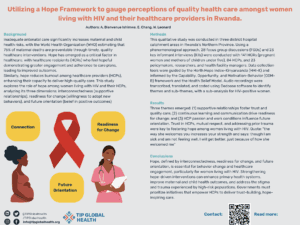Hope and Quality Care for Women With HIV
Utilizing a Hope Framework to gauge perceptions of quality health care amongst women living with HIV and their healthcare providers in Rwanda.
Our recent study, accepted for IAS 2025, Utilizing a Hope Framework to Gauge Perceptions of Quality Health Care Amongst Women Living with HIV and Their Healthcare Providers in Rwanda, explores how hope rooted in supportive relationships, readiness for change, and belief in positive outcomes can transform the healthcare experiences of women living with HIV. Conducted across three district hospital catchment areas in Rwanda’s Northern Province, the qualitative study engaged 141 healthcare recipients and 84 providers to understand how emotional connection and trust influence care engagement and outcomes.
To ensure analytical rigor, the study utilized the Herth Hope Index-Kinyarwanda (HHI-K) and was informed by both the Capability, Opportunity, and Motivation-Behavior (COM-B) framework and the Health Belief Model. These tools helped uncover the emotional and behavioral dimensions of hope as experienced by both patients and providers.
Findings revealed that when healthcare providers offer respectful, compassionate care, they foster hope, reinforce patient adherence to care plans, and contribute to improved health outcomes. As one participant expressed, “The way she welcomes you increases your strength. I will get better, just because of how she welcomed me.” Key to fostering hope were trust, mutual respect, and the need to directly address prior trauma and stigma issues particularly for women living with HIV.
This study emphasizes the importance of integrating hope-driven strategies into maternal health services. Embedding hope in healthcare delivery especially in high-stigma, resource-constrained settings, not only enhances patient engagement and outcomes but also reduces provider burnout. The abstract concludes with a critical call to action: governments must invest in empowering healthcare providers to deliver trust-building, hope-inspiring care. Doing so strengthens primary health systems and ensures more equitable, empathetic, and effective healthcare for all.


SHARE THIS STORY
